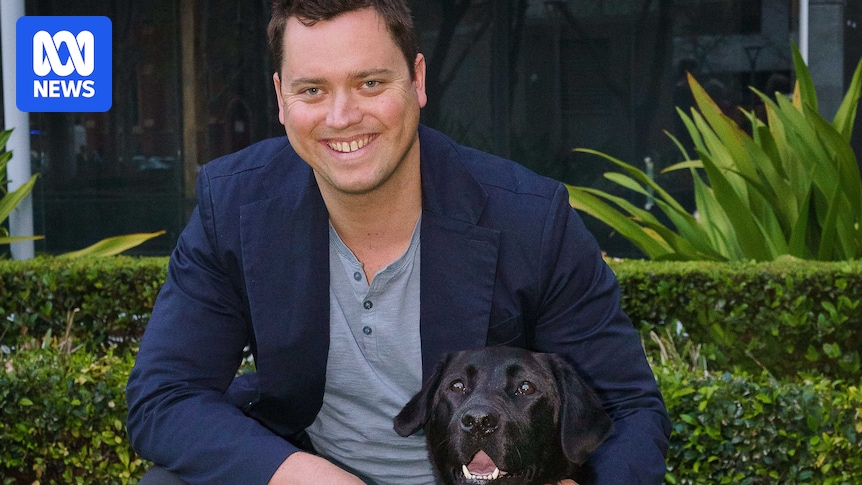Jeremy McClure is a triathlete, long-distance swimmer and four-time Paralympian, but getting a car ride with his guide dog Nina has proved one of his biggest challenges.
Due to a hereditary condition that developed when he was a teenager, Mr McClure now has only 2 per cent of regular vision.
Two weeks ago, what should have been a simple trip from his home to Rockingham train station so he could visit his parents in Perth turned into a two-hour nightmare that only ended when police got involved.
The first two Ubers Mr McClure ordered immediately cancelled the trips when they pulled up and saw Nina, saying he should have booked Uber Pet, a service for transporting animals.
“I said, ‘Mate, she’s not a pet, she’s a guide dog’ and he said, ‘Sorry, I’m cancelling your ride’, put the window up and he sped off,” Mr McClure told Nadia Mitsopoulos on ABC Radio Perth.
“Then the second one, exactly the same situation.”
Guide dogs not pets
Under the federal Disability Discrimination Act, it is unlawful to deny entry or service to someone with a disability because they are accompanied by a guide dog, and the only exceptions are places like operating theatres.
The third time Mr McClure ordered an Uber, he asked the driver to come up close to his front door, explaining that he was vision impaired.
Jeremy McClure with his previous guide dog Presley at the pool. (Supplied)
When the car arrived, he said he quickly threw his bags on the back seat before hopping in the front seat with Nina before the driver could drive off.
“He says, ‘No, sorry, you didn’t book Uber Pet’ and I said, ‘Hold on, I’ve already gone through this twice. I’m going to tell you the situation first, I’ll explain what she is,'” he said.
“I asked him: Do you know what a guide dog is? Do you know what discrimination is? And not once could he actually answer that.
“I explained they go into hospitals, shopping centres, restaurants. They’re not a pet.”
Police intervention
After he refused to get out of the vehicle, the driver took him to the local police station, while Mr McClure phoned his parents, who also phoned local police on his behalf.
“Mind you, that was really uncomfortable for me,” he said.
“But there will be people out there that would just get out and they wouldn’t be able to catch any car, so I stood my ground.”
The NSW government has increased fines for taxis and rideshare vehicles that refuse access to an assistance animal. (Supplied: Guide Dogs Australia)
While sitting in the car outside the police station, Mr McClure received a phone call from a police officer, who intervened on his behalf and spoke to the driver on speakerphone.
“I’m not going to use the exact words, but in a polite way, he said, ‘You take Jeremy right now to the station, and I don’t want any silly business’.
“And the driver said, ‘Yes’.”
Two hours later than planned, Mr McClure made it to Perth.
Laws still not well understood
Later that night, Mr McClure noticed his Uber account had been temporarily suspended.
When he contacted Uber, he said he was told a driver had made a complaint about him, alleging physical and sexual abuse.
The account was reactivated, but he said he had two more experiences where drivers objected to his guide dog.
In statement, an Uber spokesperson said the company expected all drivers to comply with laws regarding people with disabilities, including providing services to people with guide dogs.
“Drivers receive training upon sign-up, as well as ongoing education to reinforce these responsibilities. If a driver refuses service, they must pass a knowledge check with 100 per cent success to regain access to the platform,” the spokesperson said.
“A second refusal may result in permanent loss of access to the Uber driver app.
“The distress of being refused service because of an assistance animal is not something we take lightly at Uber, and we know this is a significant issue across broader society.”
Mr McClure said he was speaking out because, despite having the legal right to go almost anywhere with Nina, many people he encountered still did not understand the law.
“[Uber] need to educate and teach their drivers what a disability is, what a guide dog is, all of these things,” he said.
“It’s not about being bitter, but when I go through such a nasty experience like this, it’s simply breaking the law.
“There should be penalties for people like this too.”Discrimination Act ‘not strong enough’
Blind Citizens Australia advocacy officer Martin Stewart has previously told ABC Radio Perth that refusals of service to people with guide dogs are an “epidemic” in Australia.
Lynn was refused access to a motel with her seeing eye dog
Mr Stewart, who himself used a guide dog for 10 years, said such treatment took a huge personal toll on individuals.
“It’s humiliating, it’s embarrassing. I was refused on many occasions, and it makes you feel like you’re nothing,” he said.
He said the Disability Discrimination Act was not strong enough for people to take effective action.
“You go to the conciliation hearing, the mediation hearing, and the only thing that’s enforceable is what you agree upon,” he said.
“If you don’t agree upon it, you’re given a certificate and you are able to go to the Circuit Court or the Federal Court, at great cost and risk.
“Most people can’t do that. So that’s where it ends.
“Unfortunately, in this area, the law is not strong enough to be respected.”

